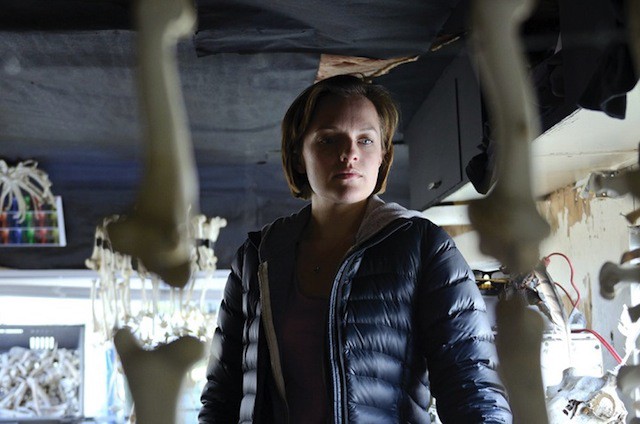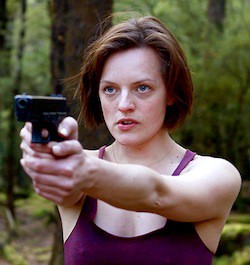A Tribute to Top of the Lake’s Robin Griffin, Made of China and Steel
by Anne Helen Petersen

Warning: Spoilers. Top of the Lake is on Netflix.
An incomplete list of all the shit that Robin Griffin has to deal with in the Jane Campion miniseries Top of the Lake:
• A mother who’s dying
• A mother who’s living with a guy who may or may not be physically abusive
• A very long (read: five year) engagement to a guy she doesn’t love anymore
• That guy’s insistent texts
• Thinking that she came home to hang out with her mom only to be pulled onto a statutory rape case that bears increasing resemblance to her own statutory rape, 15-plus years before
• A police force full of dicks, headed by a major dick who keeps hitting on her when she’s trying to get shit done
• An ex-boyfriend who inadvertently contributed to her rape but is now sexy and sinewy
• One of her actual rapists just hanging out and having beers at the local bar
• Every inch of every place in town evoking her traumatic past…
…and that only really brings us halfway through the mini-series’ seven-episode arc. Shit begats shit, and as one of several hardboiled female detectives maneuvering this type of trauma on (imported) (Netflixed) television this year, Robin wades through all of it.
But Griffin’s also the youngest and, crucially, the only woman in a narrative co-written and directed by one. And not just any woman, but Jane Campion, the director responsible for two of the films that linger most hauntingly on my heart. My freshman year in college, I listened to the soundtrack to The Piano so much that even when it wasn’t on, I was walking and moving to its rhythms like an internalized metronome. And Bright Star awoke something long dormant and romantic in me, something that wanted to lie on the bed and just watch the air move the curtains and listen to my body in love.
Which is just another way of saying that Campion is an intensely affective filmmaker: the way she (and, in this case, collaborators Gerald Lee and Garth Davis) conceive, write, and direct doesn’t just promote narrative identification, but physical empathy. When I watch her, I feel a fierce form of embodiment. It’s not just that I want to go to Lake Top; I feel Lake Top — but that “feel” is mediated through Robin’s complicated, infuriated experience of it.
Traditional cop shows make their protagonists into observers: outsiders that allow the audiences to place judgement on the situation before them. It’s a highly therapeutic narrative practice, in part because it leverages some semblance of order on the otherwise morally chaotic world around us.
But Robin is no cipher, nor is she an anti-hero — a character that weds moral repugnance with irresistable charisma. The anti-hero, at least in contemporary media, is almost always a privileged person’s gig: only white men, rich men of color, and rich white women get to be anti-heroes. All sorts of people are complicated and occasionally morally repugnant; only some (at least on television) get the privilege of being likable as well.
Robin doesn’t have the social or financial capital to be an anti-hero, and yet I like her so much better this way. The narrative gradually contextualizes her frank unlikability, but it refuses to apologize for it. From the beginning, she’s warm with children and cold with adults, including her own mother, who tells her “You can be very hard. And what I don’t like is that you think it’s strength.”
But it is strength: that coldness is armor. It’s not against one person, or even the four people who raped her. It’s against the entire fucking world — or, somewhat more precisely, a world defined by patriarchy. Think about it: her defining trauma was enacted by men brazen with the belief that they could do whatever they wanted with a woman’s body and face no consequences. And they didn’t, save a brief beating from a different group of men who designated themselves as keepers of community justice — the sort of justice that repeatedly exploits girls and women (their bodies, their labor) in the name of profit and power. Her workplace may not be filled with rapists, but the men who run it refuse to respect her or the legitimacy of the case she’s trying to solve which, uncoincidentally, revolves around a sexually victimized young girl.
There’s an old adage from the feminist “porn wars” that states “if porn is the theory, then rape is the practice.” If unchecked patriarchy is the theory in Lake Top, then rape, along with other forms of sexual exploitation, is the practice. That’s devastating to think about, but that’s what Robin’s up against. She has no time to be charismatic, or do her hair, or put on anything that’s not a hoodie and a black puffy jacket. And unlike other female protagonists who operate “within” the system, using their sexual objecthood to manipulate and exploit the men around them, Robin’s past trauma precludes that possibility. She wore a pretty white dress once, and look where it got her.
If unchecked patriarchy is the theory in Lake Top, then rape, along with other forms of sexual exploitation, is the practice.
She’s not part of the dominant order, and she can’t bring herself to play within it. So she goes about smashing it — clumsily at first, and with significant injury to herself. What’s beautiful, however, and what further separates her from other female characters on television, is her desperate desire to save the next generation of women from her own fate. Lots of characters try to save their daughters, but the wide-eyed, wordless Tui embodies something broader than blood connection.
Robin sees herself in Tui: when she watches the footage of the young girl singing in the forest, she’s mourning her lost innocence. But if were just about Tui, Robin wouldn’t have such fierce motivation to bring Matt, and the entire structure that supports him, low; nor would the narrative wouldn’t provide us with the foils of older women who, almost like a Greek chorus, telegraph the emotional and physical toll of living under patriarchy. “Paradise” can’t be Paradise so long as the old world has access road within.

Individualism and self-preservation (the fundamentals, really, of Lean In feminism) only gets us so far. Even if one person can avoid the system, there are thousands who, for reasons related to sexuality, class, body type, race, and ability, remain mired within it. Robin’s mom couldn’t save her, and Robin couldn’t save Tui from the abuse that drove her from her home. But the message of Top of the Lake isn’t “save the girl” or “save yourself.” Here, the only way to save anything is to wreck everything. When Robin’s boss says she’s being reckless in her dealings with the Mitchums, he doesn’t mean it as a compliment, but she should take it as one.
Even with the destruction of the literal and figurative Fathers, it’s not like Robin’s suddenly married and safe and has everything figured out. Those Fathers will haunt her, and Tui, and Tui’s baby, even as they build a life without them. But she’s found a compassionate, fiercely honest man who, as we learn in the last episode, has no idea who his father is. It’s a nifty bit of symbolism, and it underlines the overarching message of the show: men, as in people with penises, aren’t the problem. It’s the structures of privilege built up around them, and the liberty those structures, and the men empowered by them, take with others.
I look at Robin at the end of the show and I see all the cliched things: the vulnerability, the resilience, what seems to be something like warmth. But I also still see the eyes of the woman who broke a beer bottle in half and gouged her rapist with it, and the body that walked into the freezing cold lake and nearly didn’t walk back. She is healed yet broken, both china and steel. And she is, without question, the woman who’s made me think the most this year.
Previously: Internet Work and Invisible Labor: An Interview With Danielle Henderson
Anne Helen Petersen is a Doctor of Celebrity Gossip. No, really. You can find evidence (and other writings) here, and you can read the Scandals of Classic Hollywood series here.